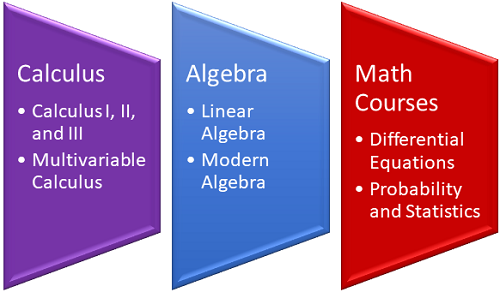What are you getting into when you pursue a degree in math education? Whether your mathematics education program is part of your school’s mathematics department, education department or equal parts of each as a dual major, your curriculum will require a great deal of coursework in both of these disciplines. Learning high-level college math is as important as learning the techniques of effective instruction, classroom management and evaluation. Of course, your coursework may differ somewhat depending on your school’s and your state’s requirements. Some mathematics education programs will prioritize advanced math coursework, while others leave off math studies at a more moderate level of difficulty in favor of devoting more of the curriculum to education coursework.
Math Coursework for Aspiring Educators
It’s a good thing that you enjoy studying math, because there are a lot of math courses in your future. Students in a Bachelor of Arts (B.A.) or Bachelor of Science (B.S.) degree program in math education should expect to take Calculus I, II and III. You may also encounter calculus in other required or elective courses, such as Analytical Geometry, Multivariable Calculus and Vector Analysis. Algebra is another important branch of math for aspiring math teachers to study. Coursework in linear algebra, abstract algebra, modern algebra and matrix algebra. Math courses in differential equations, discrete mathematics, probability and statistics, analysis and mathematical modeling are all important for acquiring a thorough understanding of college-level mathematics. After all, before you can teach math to young people, you must understand the concepts and applications yourself.
Although your curriculum includes a lot of required courses, you can customize your education through electives. Students might choose to take further courses in scientific computation, applied math, statistics, coding theory and many more areas of interest.
Classes in Teaching and Classroom Management
You need more than extensive math knowledge to be a good math teacher. Your education courses will help you develop the skills to share what you know with students. Most college degree programs in teaching include studies in child or adolescent psychology, presenting information and effective instruction for students of different backgrounds and levels of ability, the United States Bureau of Labor Statistics (BLS) reported. Expect to take courses such as Learning and Instruction, Teaching Exceptional Students, Teaching Strategies for Diverse and Special Education Populations, Instructional Design and Classroom Management.
IMAGE SOURCE: Pixabay, public domain
The grades you are interested in teaching will affect the curriculum of your teacher preparation program. While many mathematics education programs focus on high school education, some exist for aspiring elementary school or middle school teachers.
Real-world teaching experience plays a big part in your career preparation. No matter which grade level you intend to teach, you usually must complete a semester of supervised student-teaching experience before you can graduate and attain your teaching license.
Interdisciplinary Courses for Math Teachers
It’s not enough to understand math and teaching as two independent subjects of study. To become an effective educator, you must integrate these disciplines. Many schools offer interdisciplinary classes that are valuable for aspiring math teachers, such as courses in the history of mathematics or in teaching math to students in the middle grades or high school grades. An interdisciplinary class for math teachers may be general in nature or focus on distinct branches of math, such as geometry, probability and statistics or advanced high school mathematics.
Depending on your math education program’s requirements, courses like Algebra for Teachers or Geometry for Teachers may take the place of traditional classes in these math disciplines or complement these courses by covering the topic from a different perspective.
Graduate Coursework in Mathematics Education
Generally, there are two kinds of graduate programs in the field of math education. Some master’s degree programs in mathematics education admit only licensed teachers who want to expand their knowledge base. These educators may want to become qualified to teach at other grade levels besides those they are already certified for, or they may simply want better their skills for their own satisfaction and the benefit of their students.
For career-changers with a bachelor’s degree but no coursework in teaching, there are specially tailored master’s degree programs in education, sometimes referred to as “alternate route” certification programs. These graduate programs of study equip prospective teachers with the skills to succeed in the classroom as well as the qualifications for initial teacher licensure.
If you want to get your teaching certification faster and don’t care about earning a master’s degree, you might also consider a graduate certificate program, which can take as little as a year to complete. All states offer some form of alternate route teaching certification option, the BLS reported, but the requirements vary from one state to another. To make sure they aren’t wasting their valuable time and money, prospective students should always make sure their intended alternate route education program meets their state’s licensing requirements.
One reason teachers earn a master’s degree is the salary bump that accompanies it. The size of the wage increase grows with the level of experience the teacher has, but it can range from a few thousand dollars per year to more than $30,000 in some school districts.
Additional Resources
What Is the Difference Between a Mathematics Degree and a Mathematics Education Degree?
How Long Does It Take to Get a Degree in Mathematics Education?
What Is the Salary Potential for Someone With a Mathematics Education Degree?
How Advanced Does My Degree in Mathematics Education Have to Be to Get a Good Job?



